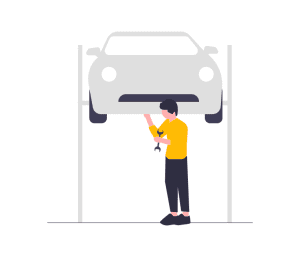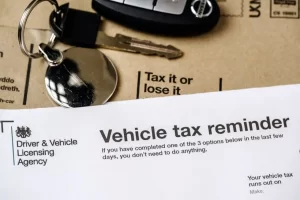Your ultimate MOT and car servicing guide!
Car servicing and MOTs are separate maintenance tasks which can be performed on your vehicle. A car service isn’t a legal requirement and is a personal choice, but an MOT is an annual, legal requirement once your car is more than 3 years old. A car service and MOT check for different things and both are essential to ensuring your vehicle is in the best condition it could be. Find out more about both below.
What is a car service?
A car service is a routine health check which aims to keep your car in the best condition. A car service can’t be completed at home and must be carried out by a trained mechanic. During your service, the mechanic will check things like your brakes, engine belt, and oil filters for general wear and tear. They will also ensure all your fluid levels are topped up and replace them if not.
When should you get your car serviced?
As a general rule of thumb, you should aim to have your car serviced every 12,000 miles or every 12 months – whichever comes first. Records of services will be kept in your service book. Traditionally, the service book would be a physical book which is stamped each time a service has been performed but many modern cars now record their service history electronically. Find out more about how often you should service your car?
Benefits of having your car serviced regularly:
Whilst car servicing isn’t a legal requirement, it is highly recommended for a number of reasons:
- Changing oil and air filters will make your engine run more smoothly and efficiently.
- Having your tyre pressure and suspension checked during a service can help with fuel economy.
- It can increase the lifespan of your car and avoid common car faults.
- Regular services can increase the value of your car when compared to not having them performed.
- By keeping your car well maintained, you can improve the safety of your vehicle.
- Slows depreciation rates and increases the resale value of your vehicle.

Types of car finance service:
In the UK, there are three types of car services you could pay for. They are a full service, interim service and a major service.
- Interim Service – An interim service does what it says on the tin and is recommended in between full service. Usually, an interim service is performed every 6 months or for every 6,000 miles your car has driven. The main parts of your car are inspected such as brake pads and discs, tyres, and common wear and tear areas. Your oil and filter will usually be changed too.
- Full Service – A full service is your annual or 12,000-mile service. It provides the same checks as an interim service but with additional work such as more in-depth brake checks and air filter replacements.
- Major Service – A Major Service is recommended every two years or around the 24,000-mile mark. It is the most extensive car service you can get and checks all components of your car and makes recommendations to give it a clean bill of health.
How much does a car service cost UK?
In the UK, a car service cost will be determined by the size of your vehicle and the type of service you choose.
Below is the average cost of a car service in the UK:
- Interim Service – £110
- Full Service – £170
- Major Service – £210
What is the difference between a car service and MOT?
An MOT is a legal requirement whereas a car service is not, but it is important to have each. An MOT is designed to ensure your car is road-worthy and the inspection carried out is based on legal requirements set by the DVSA. A car service ensures your car’s health is in its best possible condition, and focuses on ensuring your car runs as efficiently and safely as possible.
What is a car MOT?
An MOT is a legal, yearly requirement for all cars in the UK once they are over 3 years old. It is an illegal driving offence to have a car without a valid MOT certificate. Brand-new car buyers don’t need to have an MOT performed until the vehicle is 3 years old because its parts and components are brand new. An MOT is performed to verify the vehicle is road-worthy and follows guidelines set by the DVLA. It is possible for a car to fail an MOT and you would have to have any problems rectified and the MOT test taken again. A car cannot be driven on UK roads until it has passed it’s MOT with a clean bill of health.

What does an MOT include?
During an MOT, it is common for the following parts of the car to be checked in accordance with the DVSA.
- Steering and suspension.
- Brakes.
- Seat belts.
- Exhaust, fuel and emissions.
- Tyres.
- Electrical equipment.
Can you fail an MOT?
Yes, your car can fail an MOT.
Unlike a car service, an MOT is on a pass or failure basis. If you pass an MOT, your car will be awarded a pass certificate and will be recorded in the MOT database. With a pass, you could also be given a list of ‘advisory’ or ‘minor’ problems which will need to be fixed in the near future.
If your car fails its MOT, you may not be able to drive the car until its problems are fixed. In this case, you will need to have issues to be fixed and then another MOT test will be performed to pass the vehicle. If your car fails its MOT but no ‘dangerous’ problems were identified, you can drive the car, but you will need to have the issues fixed ASAP anyway.
Can I appeal a failed MOT result?
Yes, you can appeal a failed MOT status on your car.
You should discuss the result of your MOT with the mechanic/test centre first. If you believe the failure was unfair, you can appeal it to the DVSA through a complaint form within 14 days of the test. If the DVSA agrees to have a retest performed, you will need to pay a full test fee again. If the appeal is successful, you will get a refund.
How much does an MOT cost?
The average UK MOT is usually around £30.
There is a maximum amount a garage can charge for an MOT test to be performed. Currently, this stands at £54.85.
Related articles:

Telltale signs it’s time for a new car.

Top tips for test driving a car.


